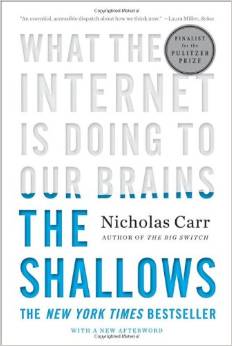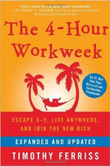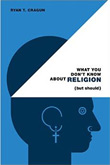Surfing World Wide Web Breeds Shallow Thinking
Brandon Sun, April 2, 2012 - David McConkey
I am a super Internet enthusiast. So I approached with much
interest
the recent book The
Shallows:
What the Internet is Doing to
Our Brains.
As a citizen, as a father, and as a writer, I greatly appreciate the
Internet. It has opened up whole new worlds: in enlightenment,
engagement, entertainment, and employment.
The
Shallows author Nicholas
Carr also recognizes the wonderful
advantages of the Internet. A writer on technology issues, he calls
the
Net a “godsend” for his research and work.
“Even when I’m not working,” Carr says, “I’m as likely as not to be
foraging in the web’s data thickets – reading and writing e-mails,
scanning headlines and blog posts, following Facebook updates,
watching
video streams, downloading music, or just tripping lightly from link
to
link to link.”
But he became concerned when he noticed that the Internet seemed to
be
reducing his “capacity for concentration and contemplation.” That
led
him to write an article in 2008 for The
Atlantic magazine, Is
Google
Making Us Stupid? That magazine piece grew into the
book.
In The
Shallows,
Carr presents an interesting survey of the history
of media from the introduction of writing to the electronics of
today.
He also includes the musings of thinkers from Socrates to Marshall
McLuhan, as well as the latest in brain research.
The Internet is having a huge impact on us. This is independent of
the
content. As McLuhan said, “The medium is the message.” But like fish
that are unaware of water, we are often oblivious to what surrounds
us.
“We’re too busy being dazzled or disturbed by the programming to
notice
what’s going on inside our heads.”
Neuroscience research confirms this. Using the Internet physically
changes our brains. And the Internet is making our thinking more
shallow.
The Internet is affecting us in two important ways. First, all that
web
surfing is influencing the way we think and understand the world. We
have become very fast consumers of little bits of information; we
stay
on any one web page for an average of only 20 seconds.
Second, time spent on the Internet reduces time for other
activities. A
common assumption is that the Net simply replaces the TV. But this
is
not the case: TV viewing is also increasing.
Instead, the Internet robs largely from the time we used to spend
reading newspapers, magazines and books. And that also changes us.
As
Carr says, “deep thinking” is often associated with “deep
reading.”
One myth that Carr dispels is that the impact of the Internet is
generational. The stereotype? Young people are the most superficial
thinkers.
But Carr points out that shallow thinking is now widespread. He
notes a
huge study that analyzed 30 million scholarly articles published
over
six decades in academic journals. That study had a very surprising
finding. Although the Internet makes reading and referring to more
sources much easier, there is actually less research today. Fewer
sources are being cited now compared to before the
Internet.
So today even academics are reading less deeply. And perhaps more
ominously, academics are thinking less creatively. Ironically, the
“broadening of available information” on the Internet has led to a
“narrowing of science and scholarship.”
Carr concludes that we are in the midst of an intellectual and
cultural
revolution on the scale of the introduction of the printing press
550
years ago.
 We are seeing the transition from the “contemplative, reflective and
imaginative” linear mind. A mind that was developed and nourished
for
centuries by reading the printed page.
We are seeing the transition from the “contemplative, reflective and
imaginative” linear mind. A mind that was developed and nourished
for
centuries by reading the printed page.
But now the Internet is ushering in a “new kind of mind that wants
and
needs to take in and dole out information in short, disjointed,
often
overlapping bursts.”
After reading the book, I was left thinking: Can we counteract, even
a
little, the new mindset of “the shallows”? I sure hope so. Inspired
by
the book, I drafted my own list of suggestions for deepening
our
thinking in the Internet age. I posted those suggestions –
where else?
– on the Internet! (You can find them by doing a search on Google.)
An increasingly important question confronts all of us: What is the
Internet doing to our brains?
"The Shallows" on Amazon.com (on
Amazon.ca
)
Deepening Our Thinking in the Internet Age: Ten Tips
Exploring What's Lost in a Connected World
Deepening Our Thinking in the Internet Age: Ten Tips
Popular Right Now:
- 15 Tips for Healthy Eating
- Quality of Life, Well-Being Research Something We Can Feel Good About
- Diets Don't Work, So What Does?
- Political Contributions: Top Ten Canadian Tax Tips
- Nestle Fitness 14 Day Weight Loss Program; What is Wrong Here?
- Charitable Donations: Top Ten Canadian Tax Tips
Must Read Books:
The 4-Hour Workweek:
Escape 9-5, Live Anywhere, and Join the New Rich

What You Don't Know About Religion (But Should)

In Defense of Food:
An Eater's Manifesto

The Life-Changing Magic of Tidying Up:
The Japanese Art of Decluttering and Organizing

Don't
Even Think About It:
Why Our Brains are Wired to Ignore Climate Change

Like This? Share It!
Press Ctrl + D to Bookmark!
